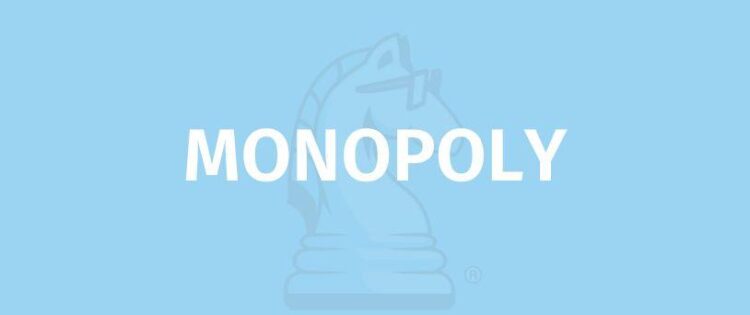
OBJECTIVE OF MONOPOLY: Send every other player into bankruptcy through buying, renting, and selling property.
NUMBER OF PLAYERS: 2 to 8 players
MATERIALS: Monopoly board, 28 deed cards, 16 chance cards, 16 community chest cards, 32 houses, 12 hotels, 2 dice, 8 game pieces, and money
TYPE OF GAME: Board Game
AUDIENCE: All ages
OVERVIEW OF MONOPOLY
This post contains some partner links for various products.
- FAST-DEALING PROPERTY TRADING GAME: It’s a Family Game Night staple! Players...
- BUY, SELL, AND TRADE TO WIN: Players compete to buy out neighborhoods, sell...
- BUILD HOUSES AND HOTELS: Love that feeling when an opponent lands on an owned...
You may love or hate it, but Monopoly is one of the most famous and popular board games in the world. An aptly named multiplayer board game, Monopoly is an economics-themed game in which players move around the game board using dice, buying and trading properties as they go! And the goal of the game? Collect rent from the opposing players and drive them into bankruptcy! You can play Monopoly with as few as 2 players and as many as 8.
Monopoly, as you know it today, is one of the most popular, if not the MOST popular, board games of all time. Funnily enough, despite its popularity, Monopoly is one of those board games that can easily get confusing with differing rules in different households. So, to dispel all those future arguments, here we are with the official rules of Monopoly! Let’s get into it!
HISTORY OF MONOPOLY
American Elizabeth Magie designed the earliest known version of Monopoly, dubbed The Landlord’s Game. It was first patented in 1904 but existed at least 2 years prior. Magie, who was a follower of Henry George, an American political economist, initially aimed for The Landlord’s Game to illustrate the fiscal consequences of Ricardo’s Law of Economic rent as well as Georgist concepts of economic privilege, including land value taxation. Phew, that’s a mouthful! In other words, she created this game to show how greedy landlords can exploit tenants.
Following 1904, a slew of board games were created which featured the central concept of buying and selling land. But it wasn’t until 1933 that Charles Darrow drew upon these earlier board games to create his version of Monopoly. Eventually, the Parker Brothers acquired the game, promoting the board game as something created by an out-of-work engineer looking for something fun to do during hard times. Unfortunately, Elizabeth Magie remains largely uncredited for her invention of the game, and for many decades, it was accepted that Darrow was the creator.
SETUP FOR MONOPOLY
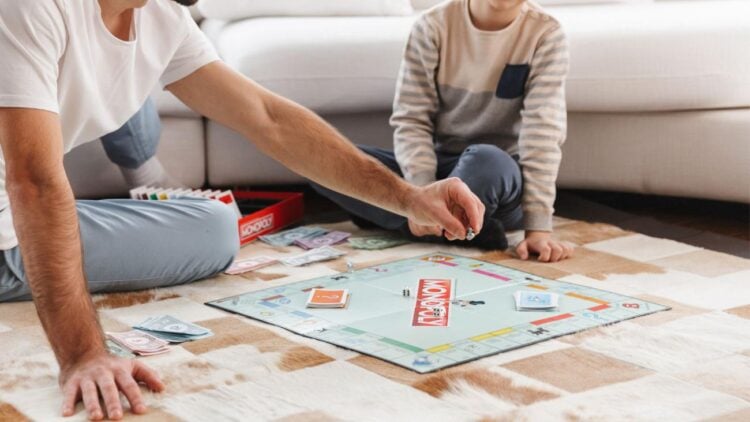
Before we jump straight into the rules, it’s important to set up the game of Monopoly correctly. First, let’s make sure you have everything you need from the Monopoly box before we set everything up to begin play!
WHAT’S IN THE BOX?
A Monopoly board game consists of the following pieces:
- Monopoly Board
- 28 Deed Cards
- 16 Chance Cards
- 16 Community Chest Cards
- 32 Houses
- 12 Hotels
- 2 Dice
- 8 Game Pieces
- Money (Denominations include $500, $100, $50, $20, $10, and $1)
HOW TO SET UP THE MONOPOLY GAME
To begin, place the Monopoly board on a table with the Chance and Community Chest Cards face-down in their respective spaces on the board. Each player chooses a token or game piece to represent themselves on the board. Place each token on Go.
Each player begins with $1,500, which is divided into:
- 2x $500
- 2x $100
- 2x $50
- 6x $20
- 5x $10
- 5x $5
- 5x $1
The remaining money goes to the Bank. Stack the Bank’s money on the edge of the compartments in the plastic banker tray.
THE BANK AND THE BANKER
Choose a player to act as the Banker. The Banker is in charge of the money and collecting any fees. The Banker must keep their personal funds separate from the Bank’s funds. But if there are five players in the game, the Banker can choose to act only as the Banker and Auctioneer.
In addition to the Bank’s money, the Bank also holds the Title Deed Cards, as well as the houses and hotels prior to player purchase. The Bank sells and auctions properties, while handing out the corresponding Title Deed Cards throughout gameplay. The Bank also loans money required for mortgages. Furthermore, the Bank collects taxes, fines, loans, and interests as required.
Note that the Bank can never go “broke.” So, if the Bank happens to run out of money, the Banker may issue more money with ordinary slips of paper.
HOW TO PLAY MONOPOLY
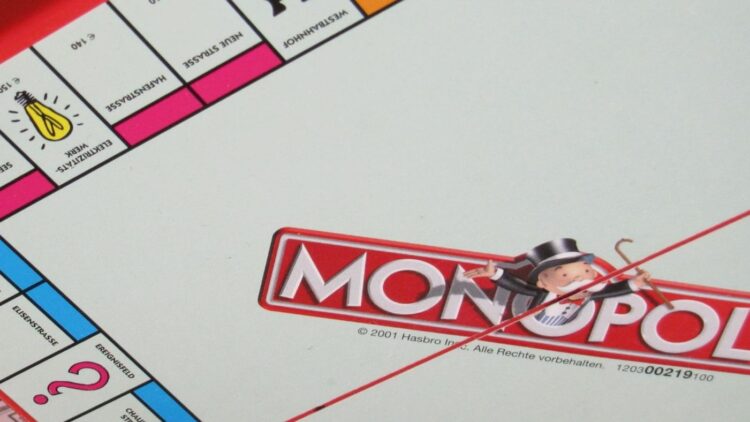
So, now that you’ve set everything up, let’s get started and play Monopoly!
Beginning with the banker, each player takes turns rolling the dice. The player who gets the highest total starts the game by rolling both dice. The player must then move their token the corresponding number of spaces on the Monopoly board. For example, if a player rolls a 13, they must move their token 13 spaces. Tokens can only move clockwise.
Depending on the space your token lands on, you now have the opportunity to do one of the following:
- Buy property
- Pay rent
- Pay taxes
- Draw a Chance Card
- Draw a Community Chest Card
- Go to jail
If you roll doubles, you may move your token normally. Then, roll the dice again for a second turn! But pray that you don’t throw more than two doubles, as you’ll be “caught speeding”! When this happens, players must immediately move their token to the Jail space on the Monopoly board if they roll doubles three times in a row.
After the first player completes their play, the player on their left then gets a turn to roll their dice.
Keep in mind that the tokens must remain on the spaces occupied and proceed from that point on the player’s next turn. Two tokens may occupy the same space at a single time.
Now that we’ve got the basic rules out of the way, let’s go over what the individual spaces on the Monopoly board mean!
LANDING ON GO
According to official Monopoly rules, each time a player lands on or passes Go, the Banker must pay them $200. However, a popular house rule is that if you land on Go, as in, you don’t simply pass Go but stay on it, you double the amount of money you get. In this case, you would win $400 instead of $200. However, beware that adding this house rule may make Monopoly take even longer to finish – if that was even possible!
After passing Go, if you happen to land on a Chance or Community Chest space and draw the “Advance to Go” card, you’re in luck! If this happens, you skip the spaces around the board and move straight back to the Go space. You’ll receive another $200 (or $400, depending on house rules).
BUYING PROPERTY
Now for the fun part. Whenever a player’s token lands on an available property – as in, no one else owns it yet, the player may buy the property from the Bank for the printed value.
If, however, the player decides not to buy the property for whatever reason, the Bank sells the property by auction to the highest bidder. Every player has the chance to bid including the player who declined to buy the property initially. Bidding may start at any price. And bidding continues until the highest bidder wins the Deed Card for the property and pays the amount in cash to the Bank.
PAYING RENT
When a player lands on a property that is already owned by another player, the player who owns the property can collect rent from the other player in accordance with the list printed on its corresponding Title Deed card. You can increase the rent value by adding houses and hotels to a property.
Pay attention when playing the game, as you are responsible for asking for rent – no one else will remind you. If you fail to ask for rent before the next player rolls the dice, you won’t be able to collect any rent!
The object is to own all the properties within a color group because you can then charge double rent for any properties without buildings in that color group. Even if a property in that color group is mortgaged, this rule still applies to all the other unmortgaged properties in that group.
HOUSES
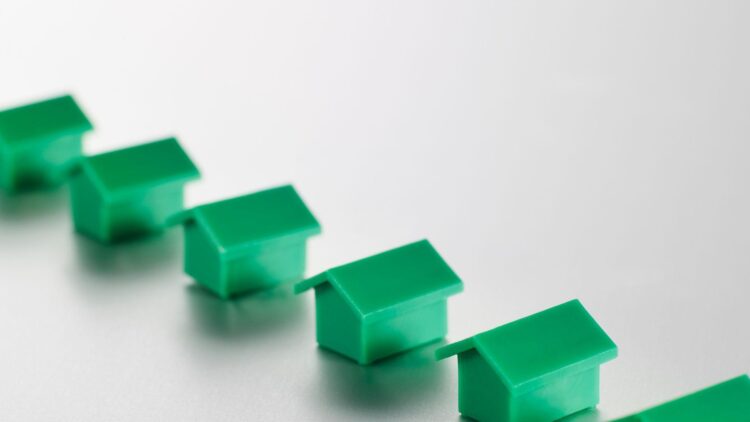
According to the official Monopoly rules, after a player procures all the properties in a color group, they may buy houses from the Bank and erect them on those properties to increase value.
If you buy one house, you can place it on any one of those properties. Each property can have up to four houses. But if you want to build more than one house on a property, you must ensure each property in the color group has one house before you can build more. And every property in a color group must have at least two houses before you can build a third. And so on. You can find the price you must pay the Bank for each house on the Deed Card for the property.
When needed, you can sell houses back to the Bank at half the original cost.
After a player reaches four houses on each property of a complete color group, they can then buy a hotel from the Bank and erect it on any property within the color group. When erecting a hotel, they must return the four houses from that property to the Bank and pay the price for the hotel as shown on the Title Deed card. Note that there is a one hotel limit per property.
Hotels are the absolute best way to maximize rent from any given property!
WHEN CAN YOU BUY HOUSES IN MONOPOLY?
Once you own a color group in Monopoly, you can make improvements to your properties by adding houses or hotels whenever you want throughout the game. There is no more need to land on the space to work on that property. You can even make improvements when it’s not your turn!
SELLING PROPERTY
Players may sell unimproved properties, railroads, or utilities privately to any other player for any agreed-upon amount. However, if there are any buildings on any of the properties within that color group, the property cannot be sold to another player. The building must be sold back to the bank before a player can sell a property within that color group.
As mentioned, you can sell houses and hotels back to the Bank for half the original price. Houses must be sold individually, in reverse order in which they were erected. Hotels, however, can either be sold at once or as individual houses (1 hotel = 5 houses), also in reverse order.
MORTGAGES
Players can choose to mortgage their properties at any point throughout the game – even when it’s not their turn. To mortgage a property, a player simply flips over the Deed Card of that property to the “mortgage” side. Then, the Bank pays the player the mortgage value listed on the card.
Note that you can only mortgage properties without any improvements (i.e. no houses or hotels). If you have any buildings on the property, you must sell them at half price to the bank first before you can mortgage your improved property.
Remember: you cannot collect any rent on any mortgaged properties or utilities. But if you own an entire color group, unmortgaged properties within the same color group can still collect double rent.
If you wish to lift your mortgage, pay the Banker the amount of the mortgage plus 10% interest (in recent editions of the board game, you may find the amount to unmortgage a property on the back of the card).
Owners can sell mortgaged properties to other players at an agreed-upon price. New owners may lift the mortgage at once by paying the mortgage plus 10% interest. However, if the new owner does not immediately lift the mortgage, they must pay the bank 10% interest when buying the property AND pay the 10% interest + mortgage cost when lifting the mortgage.
So, for example, if the mortgage is $100, to lift the mortgage, a player must pay $110. However, if a player bought the mortgaged property and did not unmortgage it immediately, they must pay a grand total of $120 in a future turn.
CHANCE AND COMMUNITY CHEST
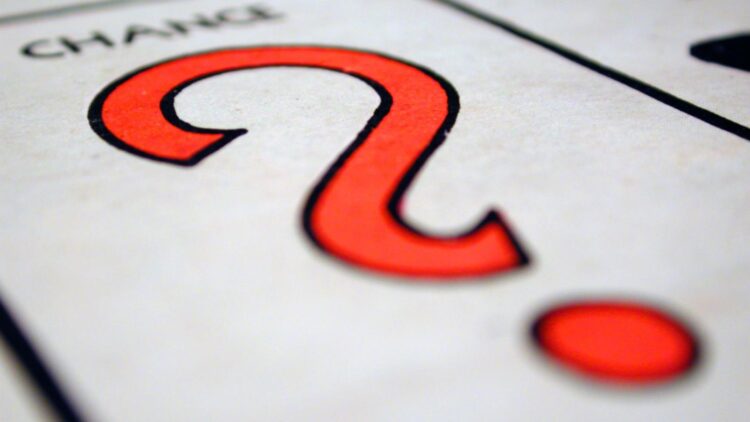
When landing on either of these spaces, take the top card from the corresponding deck. Follow the instructions, and when finished, return the card face down to the bottom of the deck.
If you draw the “Get Out of Jail Free” card, hold it until you can play it before returning it to th bottom of the deck. Interestingly, if you don’t want to keep the “Get Out of Jail Free” card, you may sell it to another player at an agreed-upon price.
INCOME TAX
If you land on an Income Tax space, you have two options:
- You may estimate your tax at $200 and pay the Bank.
- You can pay 10% of your total worth to the Bank.
What’s your total worth? That would be all of the following:
- All your cash
- Printed prices of properties – both mortgaged and unmortgaged
- The price of all buildings you own
JAIL
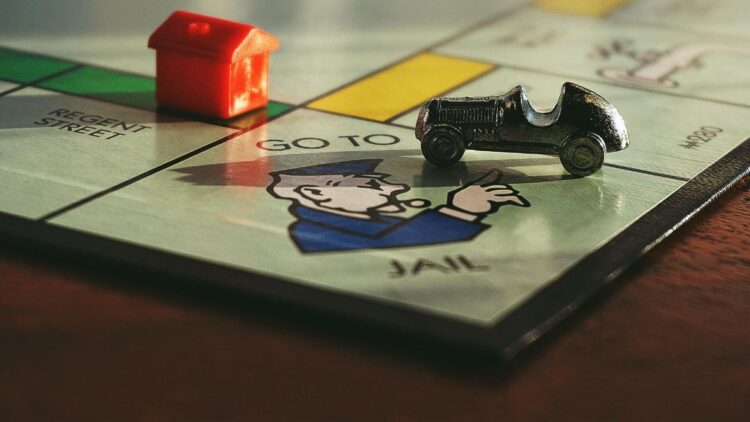
Jail is on a corner space of a Monopoly board. When in Jail, a player’s turn is suspended until:
- The player rolls a double,
- The player pays $50 to get out, or
- The player uses a Get Out of Jail Free card.
Note that if a player simply lands on the Jail space, they are “Just Visiting” and not actually in Jail.
So, how do players end up in Jail? You land in Jail if:
- Your token lands on the space marked “GO TO JAIL.”
- You draw a Chance card or Community Chest Card marked “GO (DIRECTLY) TO JAIL”
- You roll doubles three times in a row in one turn.
When you go to Jail, do not pass Go and do not collect your $200. You go directly to Jail in the “In Jail” section of the Jail space.
A player can get out of Jail “early” by:
- Rolling doubles on any of your next 3 turns. Then, move forward the number of spaces indicated by the die. Despite throwing doubles, in this circumstance, you do not roll again.
- Using or purchasing a “Get Out of Jail Free” Card. When using this card, immediately move your token to the “Just Visiting” section and roll the dice to move.
- Paying the $50 fine before rolling.
COLLECTING RENT IN JAIL
Don’t worry; you can still collect rent while in Jail. You can even buy and sell properties and buildings while in Jail.
In fact, due to this, later on in the game of Monopoly, one strategic strategy would be to go to Jail on purpose to avoid risking landing on other players’ properties. But keep in mind that you can only stay a maximum of three turns!
FREE PARKING
According to the official Monopoly rules, the Free Parking rule is simply a free resting place. When landing on this space, you do not receive any money, property, or reward of any kind. You simply wait here for your next turn.
However, a super common house rule is that throughout the game, any money paid as fees or taxes goes straight to the middle of the Monopoly board instead of the Bank. Then, the player who lands on the Free Parking space gets to collect all the money in the middle! This can be a fun unofficial rule to add, but note that this may make gameplay even longer.
BANKRUPTCY
If you owe more than you can pay another player or the Bank, you are bankrupt. This happens when you simply don’t have the cash to pay or you do not have any equivalent properties to trade or sell.
If you’re in debt to another player, you must turn over all your money and properties to the player you owe and leave the game. During this settlement, if there are any houses or hotels, you must return these to the Bank for half their cost. This cash is then given to the creditor as well.
Mortgaged properties can also be turned over to the creditor, but the new owner must pay 10% of the mortgage value to the bank. Then, the new owner can choose to unmortgage the property or simply hold it. If the new owner doesn’t unmortgage the property immediately, they must pay the mortgage value in addition to an additional 10% interest.
On the other hand, if you are in debt to the Bank for more than you are able to pay, you must turn over all assets to the Bank. All buildings are immediately removed from the properties. The Bank then auctions off all the property to the remaining players.
END OF GAME
One by one, players will go bankrupt and be removed from the game. The last player remaining with money wins the game of Monopoly!
VARIATIONS OF MONOPOLY (MONOPOLY HOUSE RULES)
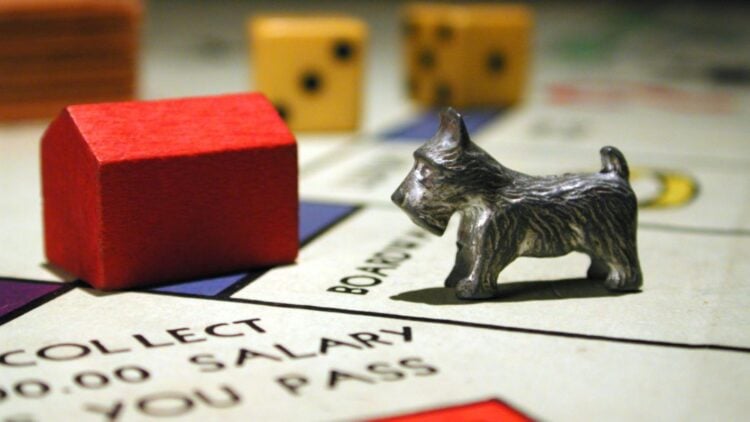
Of course, the proper way to play Monopoly is to play with the official rules and instructions that come with the box. However, if you want to spice it up a little, you can add house rules. House rules have developed over the years, which you can pick and choose from to make your ideal version of Monopoly.
FREE PARKING
The most common house rule, which we’ve already covered above, is the rule in which all money collected in terms of taxes and fees goes straight to the middle of the board. And the player who lands on the “Free Parking” space can collect all that money.
This Monopoly house rule adds an element of the lottery to the game and allows players to get unexpected income that can change the course of the game, especially if a considerable amount of cash accumulates in the center of the board.
LANDING ON GO
Another popular house rule mentioned above is that if a player lands on GO, they get to collect double the usual income. So, if your token lands exactly on GO and doesn’t pass it on your turn, you can collect $400 instead of $200.
PROPERTY DEALING
In another interesting variation, all of the property is dealt out evenly amongst the players at the very start of the game. In this version of Monopoly, there is no race to buy property and there is a plethora of money to develop properties. This considerably speeds up the game, however, it does take a bit of skill out of the game as well as some of the satisfaction of struggling to put together a successful monopoly.
BUILDING RULES
There are many variations of house and hotel building rules in Monopoly. According to official rules, you must own an entire color group before you can start building houses one by one. And each property in the color group must have the same number of houses before you can build a second and third house, and so on.
But in some variations, you can build houses on a color group that you own however you want. So, for example, one property in a color group can have four houses while another one in the same color group has just one – or even none!
Or you can forgo the entire color group rule altogether and allow players to build houses on any property that they own!
DIFFERENT MONOPOLY EDITIONS
As Monopoly is one of the most successful board games of all time, it’s no surprise that you can find many different editions of Monopoly around the world.
Here are some different Monpoloy editions you may want to check out:
- Monopoly The Mega Edition
- Monopoly Deal
- Monopoly Junior
- Monopoly Builder
- Monopoly Friends The TV Series Edition
- Monopoly Animal Crossing New Horizons Edition
- Monopoly Disney Villains Henchmen Edition
- Monopoly Pixar Edition
- Monopoly Junior Super Mario Edition
- Monopoly Travel World Tour
- Monopoly National Parks 2020 Edition
- Monopoly The Super Mario Bros. Movie Edition
- Monopoly Barbie Edition
- Monopoly The Card Game
- Monopoly Diced
You should also check out our game rules for Monopoly the Card Game, Monopoly Diced, and Monopoly Deal. You can find even more versions of Monopoly here!
MONOPOLY TOURNAMENTS
Hasbro’s official Monopoly website occasionally features information about upcoming tournaments. World championships are typically held every four to six years. For example, the past World Championship Monopoly Tournaments were in 1996, 2000, 2004, 2009, and 2015. A championship was planned for 2021 but was scrapped due to the COVID-19 pandemic.
National championships are usually held the same year as the World Championships or the preceding one. You can find information regarding national and world championships for Monopoly on the Hasbro website.
Besides the official tournaments, outside organizations can host Monopoly tournaments as a fundraiser – with permission from Hasbro. Hasbro has specific guidelines that you must follow. To apply for permission, you can simply submit a form by email.
FAQ
How Long Does it Take to Play Monopoly?
Generally, a Monopoly game will take anywhere between half an hour to 3 hours, with most taking between 60 to 90 minutes.
Can Two Players Play Monopoly?
Absolutely! You can play Monopoly with as few as two total players and as many as 8 players!
Do You Collect Rent While in Jail?
Don’t worry, while in jail, you are still technically in play, so you can collect rent. You can even buy, sell, or trade property.
Can You Borrow Money From Other Players?
According to official Monopoly rules, you cannot borrow money or property from other players. You can only borrow money from the Bank by mortgaging properties.
What Happens If I Run Out of Houses?
If the Bank has no more houses, players who want to build must wait for another player to return or sell houses before they can build.
- 30 FUN DATE NIGHT GAMES FOR COUPLES - April 18, 2024
- 200+ INSANE “KISS MARRY KILL” QUESTIONS TO ASK - April 16, 2024
- 15 BOARD GAMES FOR 5 YEAR OLDS (THAT EVEN YOU WILL ENJOY) - November 10, 2023
